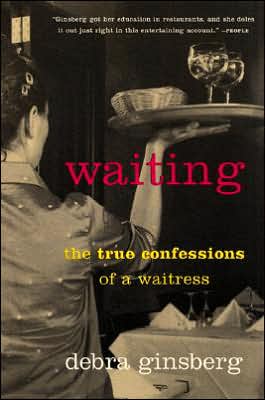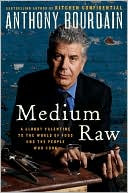Waiting: The True Confessions of a Waitress
A veteran waitress dishes up a spicy and robust account of life as it really exists behind kitchen doors.\ Part memoir, part social commentary, part guide to how to behave when dining out, Debra Ginsberg's book takes readers on her twentyyear journey as a waitress at a soap-operatic Italian restaurant, an exclusive five-star dining club, the dingiest of diners, and more. While chronicling her evolution as a writer, Ginsberg takes a behind-the-scenes look at restaurant life-revealing that yes,...
Search in google:
Many people can tell horror stories about their teenage or college stints waiting tables. For Debra Ginsberg, struggling writer and single mother, waitressing has been a means of survival-and she has the scars to prove it. In Waiting: The True Confessions of a Waitress— part memoir, part social commentary, part guide on how to behave when dining out-Ginsberg takes readers on an intimate journey of her twenty years as a waitress at the dingiest of diners, a soap-operatic Italian restaurant, an exclusive five-star dining club, and more. While chronicling her parallel evolution as a writer and single mother, the book also takes a behind-the-scenes look at restaurant life-revealing that, yes, when pushed, a server will spit in food, and, no, that's not really decaf you're getting-and at how most people in this business are in a constant state of waiting to do something else. Colorful, insightful, and often irreverent, Ginsberg's stories truly capture the spirit of the universal things she's learned about human nature, interpersonal relationships, the frightening things that go on in the kitchen, romantic hopes dashed and rebuilt, and all of the frustrating and funny moments in this life. Waiting is for everyone who has had to wait for their life to begin-only to realize, suddenly, that they're living it. Hartford Courant Hilarious...colorful.
The Big Tip-off\ "What do you do?"\ It's a simple question but one that, for many years, I was almost unable to answer. Sometimes I'd mumble evasively that I was in the service business but more often I'd say something obtuse like "I work in a restaurant." But I was a waitress and therein lay the problem. For 20 years, that particular profession, that particular answer to the question "What do you do?" engendered an almost automatic profile along with a whole set of assumptions.\ Waitresses, it seems, have a certain image in the collective consciousness; somewhere between Flo from "Alice" and the tail-sporting servers from the old Playboy Bunny Clubs. If this sounds like an unfounded and grandiose claim, consider that I performed my own informal survey for two decades. I witnessed thousands of customers form the same instant impressions of me year after year. I was their servant of the moment. My living depended on remaining in their good graces for the duration of their meal. How far would I go and what would I do to stay in those elusive good graces—how big a tip did I want, anyway? And these reactions were just from those I served at the table. I received plenty of disparaging looks from those I met simply in the course of my daily life.\ It's not that I was ashamed of my job. Part of the reason I waited on tables for so many years was the freedom and financial independence it afforded me. Yet I was consistently sensitive to the reactions it produced from anyone outside of the restaurant business. In a sense, however, prejudging or profiling is endemic of our society. Inevitably, we seek to place our fellow humans in roles we've created for them based on their jobs, their body piercings, or their style of dress. Our judgments, in turn, are based on collective impressions or commonly agreed upon (but not necessarily correct) standards.\ I've been guilty of the same prejudgment. I admit it; I'm only human.\ And because I'm only human I tried something new recently. I was shopping at my neighborhood grocery store and my friendly checker asked me what I had planned for the weekend. "I'm not going anywhere," I told her, "I've got to work the whole weekend."\ "Oh, too bad," she answered. "What do you do?"\ "I'm a writer," I told her.\ "Wow," she exclaimed, "a writer!" She smiled widely and, across her face an assumption spread bright as sunshine. Although I couldn't tell the exact nature of her assumption, I knew it was different than the all of the pigeonholes I'd been in before.\ "That must be so exciting," she said. "Good for you."\ This ability to morph my own image so easily gives me pause. Perhaps everybody is playing more or less the same game. The waitress taking my order is probably making her own assumptions about me as I stare at her from the other side of the table. Perhaps her story is much more similar to mine than I'd care to admit.\ Just possibly, she might even be me.\ Food for thought, served by your waitress.\ —Debra Ginsberg, author of Waiting: The True Confessions of a Waitress
AcknowledgmentsixIntroductionxi1.The luncheonette12.Tipping (it's not a city in china)233.The back of the house454.Working the fantasy695.The art of waiting1056.Molotov cocktail waitress1337.In the family way1598.A diner in california1899.Food and sex21110."Hello, i'll be your postfeminist icon this evening"24111.Still waiting259
\ From Barnes & NobleFor twenty years, Ginsberg was a waitress. Then, like many in "waiting" profession, she switched careers, becoming a professional writer for the San Diego Union Tribune. It was only in hindsight that she realized the strangeness and singularity of life on the other side of the table. These reflections on her waitressing experience are pleasingly varied. They do reveal kitchen masonic secrets (yes, miffed servers do spit in food!), yet offer much more than just gossip or restaurant trivia. Ginsberg's very personal sense of the frustrations and aspirations of people in the profession will be a stunning education for many readers. Just desserts.\ \ \ \ \ Oregonian[Ginsburg's] triumph, in this book, is that she shows us how the beautiful and the base coexist.\ \ \ San Francisco ChronicleA lively and insightful look into restaurants...Ginsberg is a charming and talented writer.\ \ \ \ \ Associated PressThis book is more than a saga about workplace woes...Ginsberg relives her personal struggle, waiting for her life to 'happen.'\ \ \ \ \ Business WeekAs this account shows, there's a lot of life in the waiting game.\ \ \ \ \ USA WeekendGinsberg not only shares delicious stories...but also dishes out advice that will make you laugh.\ \ \ \ \ PeopleGinsberg got her education in restaurants, and she doles it out just right in this entertaining account.\ \ \ \ \ Dallas Morning News[Ginsberg's] poignant, gently written stories of waitressing are metaphors for life.\ \ \ \ \ Detroit Free Press[Ginsberg] tells the story with enough honesty and wry humor to connect with other people—especially women.\ \ \ \ \ New Orleans Times-Picayune[A] wonderful book. It was worth waiting for.\ \ \ \ \ Seattle TimesA knowing memoir...[Ginsberg] is great on dining-room debacles she's endured.\ \ \ \ \ Hartford CourantHilarious...colorful.\ \ \ \ \ NewsdayA lively, often funny tale.\ \ \ \ \ Publishers WeeklyGinsberg has spent nearly 20 years, more on than off, as a waitress, developing a love/hate relationship with a career most of her college-educated peers see either as a way station or a pink-collar province. Though neither a fully ripe memoir nor a truly spicy dish on the food biz (for that, see Anthony Bourdain's Kitchen Confidential; Forecasts, April 24), her collection of anecdotes, covering subjects from her father's luncheonette to fancy restaurants, conveys the unpredictability and humanity of this humble but essential work. Ginsberg sketches co-workers, both lively and burnt out, and her inspired and irresponsible bosses. A good view of the "parallel mating dances of staff and patrons" is one perk of her perch; she posits that the risk-taking, gregarious types who work for tips foster mutual attractions. In the "feudal pyramid" of the waitstaff, busboys are at the bottom and managers at the top, but waitresses must keep both happy to make sure things run smoothly and that tips ensue. Some scenes are wild: as a cocktail waitress during manic "Buck Night," she saw patrons drink the potent (and free) "Bar Mat," made up of bar spillage. Readers might pick up some pointers: bad-tipping regulars will suffer subtle server sabotage; customers who harangue staff for decaf might end up with regular. Ginsberg's more personal segments, which can be aimless, portray an intelligent single mom, fiercely committed to her son, with worries about her potential as a writer and her future. She quits waitressing only to return a year later, concluding that "the act of waiting itself is an active one" and that there is beauty and simplicity in the small acts of her work. (Aug.) Copyright 2000 Cahners Business Information.\|\ \ \ \ \ Library JournalIn this memoir of 20 years of waiting tables to support herself and her son, Ginsberg, who also writes for the San Diego Union-Tribune, wavers between justifying her choice of occupation and attempting to shock or titillate readers with tales of the chaos, unsanitary conditions, and sexual harassment she experienced while working in a restaurant. She is often defensive about her work, which requires special skills and personal qualities and can be lucrative in the short term, though it is not especially respected and leaves no lasting evidence of the effort expended. However, Ginsberg does not connect her situation to the larger problems of the service economy or of women's work in general. Nor does she contribute to our understanding of how to survive in her occupation or even how to get better service in a restaurant. The section on images of waitresses in film and on television is particularly limited in insight. Not recommended.--Paula R. Dempsey, DePaul Univ, IL. Copyright 2000 Cahners Business Information.\\\ \ \ \ \ School Library JournalYA-As a child, Ginsberg marveled at her father's stories about waiting tables, which made restaurants seem exciting and glamorous. At 16, she started working in a luncheonette and has spent over 20 years in all types of eating establishments from a diner to a "prestigious" club. As she recounts the different jobs that she has held, readers discover what it really takes to be a waitress. Ginsberg feels that she must be an actress, a good listener, and a nurturer. She examines the complex physical, mental, and psychological skills required to deal with demanding customers, unscrupulous managers, and uncooperative cooks and busboys. Throughout her career, Ginsberg felt that waiting tables was only a means to her real goal of being a writer. However, over time, she realized that the work allowed her to spend real quality time with her son. With a new insight into this profession, readers will see their next waitperson in an entirely new light.-Jane S. Drabkin, Potomac Community Library, Woodbridge, VA Copyright 2000 Cahners Business Information.\ \ \ \ \ Julia DahlGinsberg's clear eye and calm voice make Waiting an insightful piece of social history as well as a delightful read. \ —Redbook\ \ \ \ \ Bruno Dagens[Ginsberg] writes positively but not Pollyannaishly and has told an attractive story about coping with a life that has been different than what she expected. \ —The New York Times Book Review\ \ \ \ \ Daneet Steffens...the overall effect is often funny and ultimately satisfying.\ —Entertainment Weekly\ \ \ \ \ Kirkus ReviewsA fresh new writer and seasoned waitress will be your server for this memoir of a life measured out with coffee spoons. It's not the same story as Prufrock's. This plat du jour is as mundane as meat loaf and, even loaded with filler, as easy to digest. Starting in her teens, Ginsberg has served in her family's borscht belt luncheonette and in a stodgy, WASPy private club. For over 20 years she's delivered slices in pizzerias, drinks in bars, and good eats in restaurants nationwide. It's been no piece of cake. It's true: some provoked servers may spit in an insensible customer's soup, stomp on a returned steak, or tamper with a cheapskate's doggy bag contents. But patrons may just as frequently be remarkably nasty or truly stupid. Looking for a free meal, they may plant bugs in their food. Worst of all, they may even stiff their waiter or waitress and leave no tip at all. Discussing the theory and practice of waiting tables, Ginsberg updates the Federal "Occupational Outlook Handbook" and deconstructs films and TV shows that feature food servers. She notes the value of adopting a persona, true or false, and presents, with considerable verisimilitude, the sounds, the smells, the panic, the steamy drama of a busy kitchen. It's not the savage scene once limned by dishwasher George Orwell, down and out in London and Paris, and there are no small servings of sex. It's close and feverish, after all, in Ginsberg's domain. As well as a guide to acceptable table manners, this is a memoir of people she's worked with and for—of blighted romances and of growing up in an apron, order pad in hand. On the whole, she seems to have enjoyedthejob. Not a definitive study of the profession, but simply one woman's tale of table service and, equally, of her lovers, her friends, and her family. Served with a smile.. . .\ \








